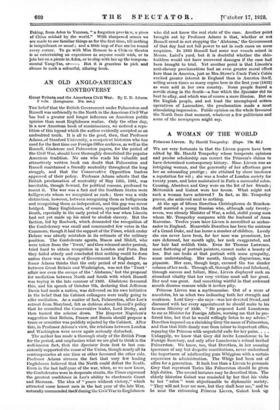AN OLD ANGLO-AMERICAN CONTROVERSY
Great Britain and the American Civil War. By E. D. Adams. 2 vols. (Longman. 30s. net.)
Tim belief that the British Government under Palmerston and Russell was unfriendly to the North in the American Civil War has had a greater and longer influence on American public Dpinion than most Englishmen realize. Only the other day, is a new American book of reminiscences, we noticed a repe- tition of this legend which the author evidently accepted as an undoubted truth. It is all to the good, then, that Professor Adams, of Stanford University, a competent historian who has used for the fast time our Foreign Office archives, as well as the Russell, Gladstone and Palmerston papers, for the period of the Civil War, should have thoroughly demolished the popular American tradition. No one who reads his valuable and attractively written book can doubt that Palmerston and Russell maintained a friendly neutrality throughout the long struggle, and that the Conservative Opposition leaders approved of their policy. Professor Adams admits that the British proclamation of neutrality of May 13th, 1861, was inevitable, though Seward, for political reasons, professed to resent it. The war was a fact and the Southern States were belligerents whom we recognized as such ; there was a wide distinction, however, between recognizing them as belligerents and recognizing them as independent, and this gap was never bridged. Many Englishmen, of course, sympathized with the South, especially in the early period of the war when Lincoln had not yet made up his mind to abolish slavery. But the faction, led by Roebuck, which demanded the recognition of the Confederacy was small and commanded few votes in the Commons, though it had the support of the Times, which under Delane was utterly mistaken in its estimate of the military position. The Confederate agents, Mason and Slidell, who were taken from the ' Trent,' and then released under protest, tried hard to obtain recognition in London and Paris. But they failed utterly and concluded that nothing could be done unless there was a change of Government in England. Pro- fessor Adams thinks that the only period of real danger, as between Great Britain and Washington, was not the ' Trent' affair nor even the escape of the Alabama,' but the proposal for mediation between North and South with which Russell was toying in the late summer of 1862. Gladstone favoured
this, and his speech of October 7th, declaring that Jefferson Davis had made a nation, was delivered on his own initiative in the belief that his Cabinet colleagues were really going to
offer mediation. As a matter of fact, Palmerston, after Lee's retreat from Maryland, felt so dubious about Russell's policy that he consulted the Conservative leader, Lord Derby, and then turned the scheme down. The Emperor Napoleon's suggestion that Britain, France and Russia should propose a truce or armistice was publicly rejected by the Cabinet. After this, in Professor Adams's view, the relations between London and Washington were never again seriously disturbed.
The author has made a thorough study of the British Press for the period, and emphasizes what we are glad to think is the
well-known fact, that the Spectator from first to last con-
sistently supported the cause of the Union, though nearly all its contemporaries at one time or other favoured the other side.
Professor Adams stresses the fact that very few leading Englishmen believed that the North could defeat the South. Even in the last half-year of the war, when, as we now know,
the Confederates were in desperate straits, the Times expressed
the greatest confidence in Lee's ability to checkmate Grant and Sherman. The idea of " peace without victory," which
attracted some honest men in the last year of the late War, naturally commended itself during the Civil War to Englishmen who did not know the real state of the case. Another point brought out by Professor Adams is that, whether or not Russell erred in not stopping the Alabama,' the Government of that day had not full power to act in such cases on mere suspicion. In 1863 Russell had some war vessels seized in Messrs. Laird's yard, but it is doubtful whether the ship- builders would not have recovered damages if the case had been brought to trial. Yet another point is that Lincoln's anti-slavery proclamations had an even greater moral effect here than in America, just as Mrs. Stowe's Uncle Tom's Cabin excited greater interest in England than in America itself, selling seven times as many copies here in the first year (1852) as were sold in her own country. Some people feared a servile rising in the South—a fear which the Spectator did its best to allay, and which was of course a mere illusion. But on the English people, and not least the unemployed cotton operatives of Lancashire, the proclamation made a most stimulating impression. Public opinion on the whole favoured the North from that moment, whatever a few politicians and some of the newspapers might say.


















































 Previous page
Previous page